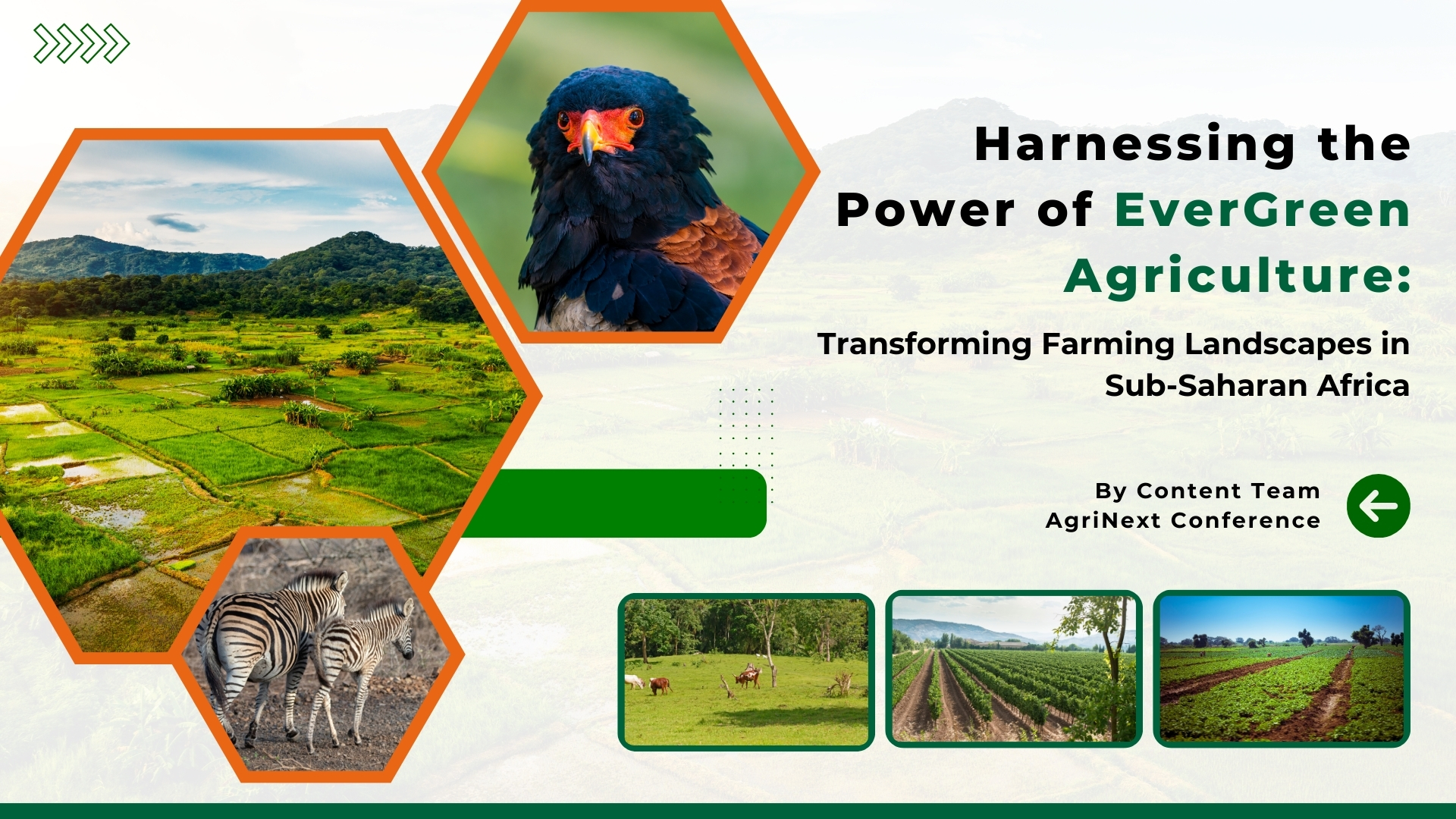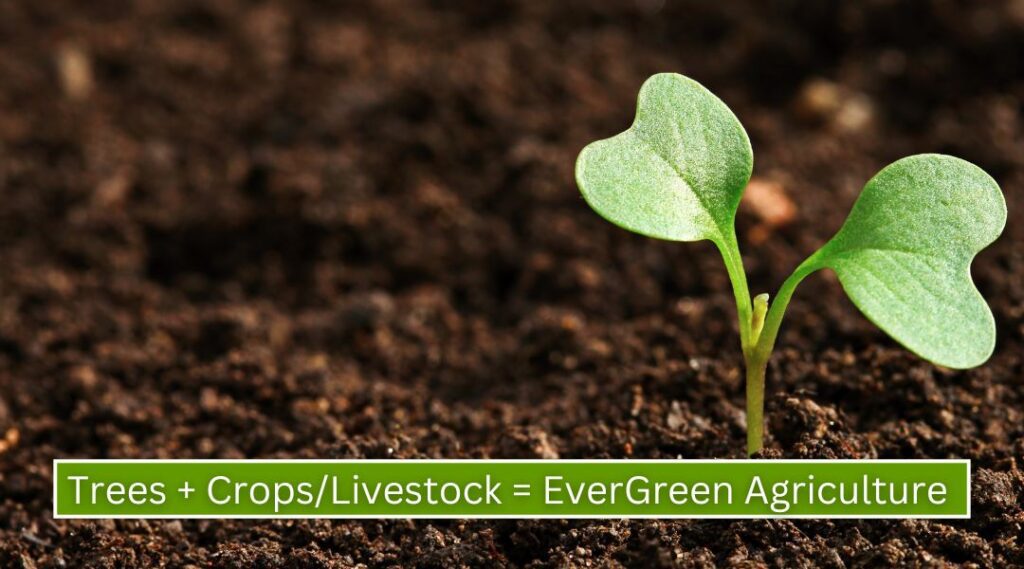
Introduction:
In the vast agricultural landscapes of Sub-Saharan Africa, a groundbreaking initiative known as EverGreen Agriculture is making waves. By integrating trees into farming systems, EverGreen Agriculture offers a sustainable solution to address pressing challenges such as soil degradation, climate change, and food insecurity.
Evergreen agriculture focuses on maintaining green cover year-round through practices like intercropping trees with annual crops, helping to combat soil erosion, retain moisture, and promote nutrient cycling.
Table of Contents
The Emergence of EverGreen Agriculture:
Evergreen agriculture gained prominence in sub-Saharan Africa through the efforts of various organizations and researchers. One notable initiative was the Evergreen Agriculture Partnership, a collaborative effort involving organizations like the World Agroforestry Centre (ICRAF), the Alliance for a Green Revolution in Africa (AGRA), and other NGOs. Researchers such as Dr. Dennis Garrity, a former director general of ICRAF, played a significant role in promoting evergreen agriculture as a sustainable farming practice in the region. Their work emphasized the importance of integrating trees with annual crops to improve soil fertility, increase crop yields, and enhance resilience to climate change.
Drawing on principles of agroecology, this initiative seeks to create resilient and productive farming systems by harnessing the multifunctional benefits of trees.
The “EverGreen Agriculture equation“ is a conceptual framework used to illustrate the principles and benefits of integrating trees into agricultural landscapes. The concept typically encompasses the following components:

This equation represents the fundamental principle of EverGreen Agriculture, which involves the deliberate integration of trees with agricultural crops and/or livestock within the same landscape.
The “Five Fs” of EverGreen Agriculture are:
Farmers:
Central to the success of EverGreen Agriculture are the farmers themselves. They are the primary actors who implement agroforestry and sustainable land management practices on their farms, driving the transformation of agricultural landscapes.
Fodder:
Agroforestry systems in EverGreen Agriculture often include the cultivation of fodder trees and shrubs. These provide valuable feed for livestock, contributing to improved animal nutrition and health.
Food:
Agroforestry systems integrate food-producing trees and crops, diversifying agricultural production and enhancing food security for farming communities. The production of fruits, nuts, and other food products supports household nutrition and income generation.
Fuelwood:
Trees planted in agroforestry systems serve as a sustainable source of fuelwood for cooking and heating purposes. By reducing reliance on unsustainable harvesting of natural forests, EverGreen Agriculture helps mitigate deforestation and environmental degradation.
Fiber:
Some agroforestry systems incorporate trees that produce fiber for various purposes, such as construction materials, handicrafts, and textiles. By providing alternative sources of fiber, EverGreen Agriculture contributes to sustainable livelihoods and economic development in rural areas.
These “Five Fs” highlight the multifunctional benefits of EverGreen Agriculture, demonstrating its potential to address environmental, social, and economic challenges while promoting sustainable land management practices
Case Studies of EverGreen Agriculture Success:
Faidherbia albida in Malawi:
In Malawi, the incorporation of Faidherbia :albida trees into maize fields has shown remarkable results. These nitrogen-fixing trees improve soil fertility, increase maize yields, and provide shade for crops during hot, dry periods.
In Zambia, maize planted outside the tree canopy produced average yields of 1.9 tonnes per ha, compared to 4.7 tonnes when the crop was grown under the canopy; in Malawi, maize yields increased by 100 to 400 percent when the crop was grown with Faidherbia.
Agroforestry Parklands in Niger:
Niger’s agroforestry parklands exemplify the principles of EverGreen Agriculture. By protecting and managing indigenous tree species within agricultural landscapes, farmers have restored degraded land, improved water infiltration, and increased crop yields
Key objectives of Evergreen agriculture:
The primary objectives of EverGreen Agriculture include:
Soil Fertility Restoration: Trees play a crucial role in replenishing soil nutrients, improving soil structure, and enhancing water retention, thereby revitalizing degraded land and boosting agricultural productivity.
Climate Change Mitigation and Adaptation: By sequestering carbon dioxide from the atmosphere and enhancing ecosystem resilience, EverGreen Agriculture helps mitigate the impacts of climate change while providing farmers with adaptive strategies to cope with changing climatic conditions.
Diversification and Resilience: The integration of trees, crops, and livestock diversified farming systems, reducing risks and enhancing resilience against pests, diseases, and climate variability. This diversity also provides additional sources of income and food for farming households..
Challenges and Opportunities: While EverGreen Agriculture holds great promise, its widespread adoption faces challenges such as limited access to tree seedlings, land tenure issues, and knowledge gaps among farmers.
However, with targeted investments, capacity-building efforts, and supportive policies, these challenges can be overcome, unlocking the full potential of EverGreen Agriculture to transform farming landscapes across Sub-Saharan Africa.
Conclusion: EverGreen Agriculture stands as a beacon of hope for sustainable agriculture in Sub-Saharan Africa. By harnessing the power of trees within farming systems, this initiative offers a pathway towards improved soil health, enhanced climate resilience, and increased food security for millions of smallholder farmers. As efforts to promote EverGreen Agriculture continue to gain momentum, the future of agriculture in Sub-Saharan Africa looks brighter than ever.
Signup For AgriNext Conference Newsletter

